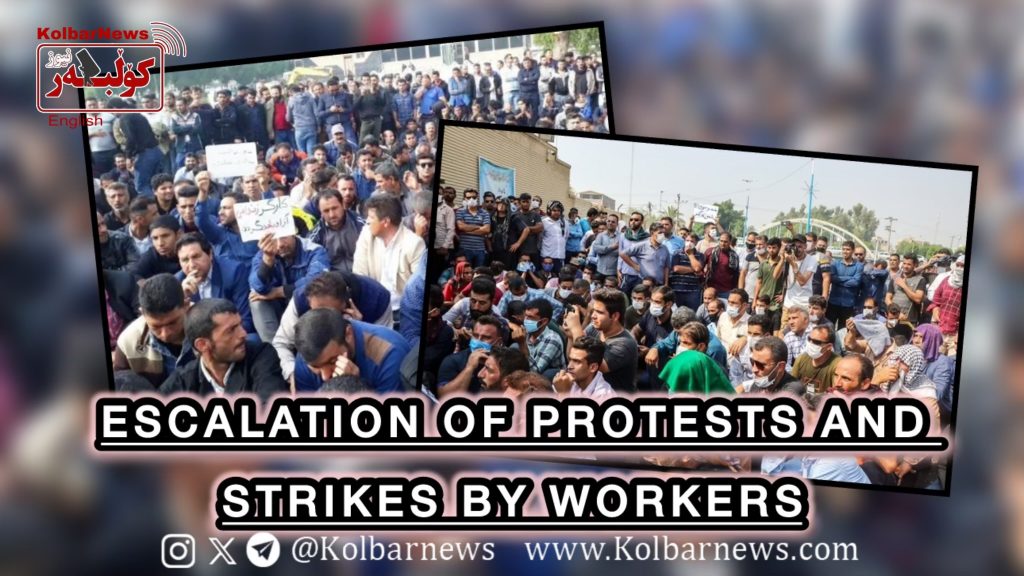
Iran has become a focal point for intense labor strikes and protests, particularly among workers in the industrial sector, such as oil workers, and in the service sector, such as nurses. Recent developments highlight the growing unrest and organization within these groups.
On Wednesday, August 28, the Council for Organizing Protests of Contractual Oil Workers reported a protest gathering by the official workers of Aghajari Oil and Gas Production Company. This protest was organized following earlier protests by workers on other platforms the day before.
On Tuesday, August 27, the council noted the continuation of protests by official, contractual, and “Arkan Thaleth” (third-party contractor) oil workers. The council detailed how well-organized the protests and strikes were, particularly in the South Pars Gas Complex, with the aim of halting production. Workers officially declared that they no longer felt obligated to continue production. The council described this as a fundamental form of labor protest, in response to the oppressive actions of managers and security forces in firing their colleagues.
Despite some urgent tasks still being carried out in certain refineries, largely due to collusion between state-aligned agents and management, the reality is that operational workers have ceased their duties and have rejected imposed work conditions.
The council also reported on new tactics being adopted by the oil workers, such as writing slogans on the walls and industrial columns of refineries. These slogans target those responsible for the exploitation, suffering, and lack of rights for workers and other oppressed people.
On August 27, the council reported further gatherings of official workers from the seventh, eighth, and ninth refineries of the South Pars Gas Complex, workers from the Pars Oil and Gas Company in Kangan (Site 2), workers from the Nasr Siri platform and other platforms of the Iranian Offshore Oil Company, and official workers in residential areas of Jam in Bushehr, along with their families. They protested and chanted slogans such as “Oil and gas are produced, our wages decrease.” They opposed the imposition of a 70 million rial salary cap and the reduction of their wages, demanding a wage increase above 100 million rial in light of the ever-increasing inflation.
The council noted that the protests on August 27 in the Special Economic Zone, among official oil and gas workers in South Pars, Asaluyeh, and Kangan, coincided with strikes and protests by nurses in Kangan Hospital and several other cities across Iran, as well as widespread protests by workers at the Arak Wagon Manufacturing Company, teachers, and retirees nationwide. These protests were well-organized and led by the Council for Organizing Contractual Oil Workers, “Arkan Thaleth,” the Council for Organizing Nurses’ Protests, the Council for Retirees’ Protests, and independent teachers’ unions.
The immediate demands of the “Arkan Thaleth” workers and supporting contracting companies at South Pars Gas Complex, as well as contractual workers, include:
– Complete elimination of contracting companies.
– The right to form unions, assemble, and protest.
– Immediate and unconditional reinstatement of fired workers.
– Fulfillment of previous agreements, especially regarding paid leave and camp allowances.
– Proper implementation of job classification schemes and fair, non-discriminatory pay systems for both official and contractual workers, as previously agreed with the Ministry of Oil.
– Implementation of job classification schemes for non-owner drivers of rental vehicles, regulation of transport, and job security for them.
– Non-discriminatory application of the 14-day work, 14-day rest schedule for administrative and support staff.
In addition to the strikes, protests, and marches organized by oil workers, nurses across several cities in Iran have mounted organized protests, forcing the new Minister of Health to acknowledge the high status of medical staff and claim that the first part of the nurses’ demands has been paid to medical universities. However, alongside these statements, there are ongoing threats to dismiss striking nurses, with one nurse at Vali-e-Asr Hospital in Arak even being arrested. Police forces have, in some cases, used pepper spray to disperse the protesting nurses, who have resisted. Nurses, in response to the repression and the meager payments, have chanted slogans similar to those of the retirees, such as “Our rights will only be won on the streets.”
Other slogans by striking nurses include “Don’t be afraid, we’re all together,” “One less embezzlement, and our rights would be paid,” “We’re the loneliest group, tired of broken promises,” “We’ve heard many promises, but no answers,” and “If we don’t get our rights, we won’t work our shifts.” So far, the striking nurses have announced 15 demands, the most important of which include a revision of the current, absurd implementation of the Nursing Tariff Law, such that each nurse’s income would be at least four times the current amount. They also demand an end to all security-related persecution of strikers, rationalization of work hours through the hiring of new nurses, and an end to mandatory overtime. The nurses’ strike, gatherings, and protests, which are unprecedented in the last century, have continued in 20 cities and 50 hospitals, and support for them is growing among labor unions and justice-seeking citizens.

